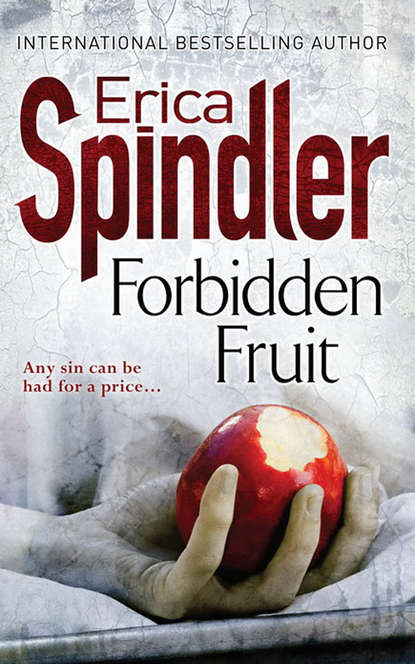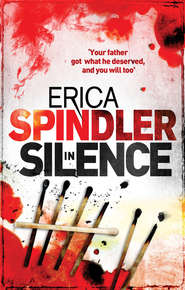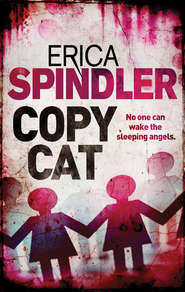По всем вопросам обращайтесь на: info@litportal.ru
(©) 2003-2024.
✖
Forbidden Fruit
Автор
Год написания книги
2018
Настройки чтения
Размер шрифта
Высота строк
Поля
To seven-year-old Glory Alexandra St. Germaine, the world was both a magical and frightening place. A place filled with everything a girl could want: beautiful dresses with lace, ribbons and bows; fine dolls with silky hair that she could brush; riding lessons and her own pony; real china tea sets for the parties she gave in the gazebo, and anything else she might point to and say she desired.
Her daddy was a part of that world, the most magical and wonderful thing of all. When she was with him, she was certain nothing ugly or unhappy could touch her. With her daddy, she felt safe and so special—like she was the most special girl ever. He called her his precious poppet, and although she thought the name too babyish for a soonto-be third-grader and complained whenever he called her that in front of other people, secretly she liked it.
Her mother never called her by anything but her given names.
Glory shifted on the hard wooden chair, her bottom numb from sitting so long in the corner. Her corner. The bad-girl corner.
Glory sighed and stubbed the toe of her mary jane against the gleaming wooden floor, careful not to make a scuff. Her mother would inspect the area after releasing Glory from her punishment, just to make sure she hadn’t been up to mischief during her penance. After all, her time in the corner was to be spent on prayer and self-reflection. Her mother had told her that at least a million times. “Glory Alexandra St. Germaine,” her mother would say, “you sit in that corner and think about what you’ve done. You sit there and think about what the Lord expects from His good little girls.”
Glory sighed again. Other mothers called their daughters sweetheart or darling or love. She had heard them. Glory drew her eyebrows together, searching her memory, trying to recall even one time her mother had called her by one of those sweet names.
As always, she drew a blank.
Because her mother didn’t love her.
Glory brought her knees to her chest and laid her head against them. She squeezed her eyes shut, wishing she could close out her thoughts as easily, wishing she could shut out the truth. But she couldn’t, and her thoughts made her feel afraid. And sad. They changed her world from a wonderful, magical place, to one that was dark and confusing. The one that frightened.
Many times she had tried to reassure herself that, of course, her mother loved her. Hope St. Germaine was simply a different kind of mama, one who didn’t like to hold or be held, one who believed discipline was more important than affection.
But Glory didn’t believe her own assurances, deep in her heart she knew what was true, no matter how much it hurt.
Tears stung her eyes, and she blinked against them. Why didn’t her mother love her? What had she done to displease her? She tried to be a good girl, she tried to be everything her mother wanted her to be. But, somehow, no matter how hard she tried, she always fell short. She either laughed too loudly or too much. She ran when her mother wanted her to walk, sang when her mother wanted prayer. Even when pleasing other people, she disappointed her mother.
Glory sighed again. Her mother thought wanting others to like her, letting them do things for her, was wicked. But Glory didn’t try to do that. With others, she got her way with nothing more than a smile; with others, she won affection without even trying.
Glory dropped her feet to the floor, longing to get off her chair and run and play. She loved to laugh. She loved to sing and dance and skip, her hair flying behind her. Mama said showing off that way was wicked, too. She said that wanting to be the center of attention was not what the Lord expected of His children.
Glory tried so hard to remember that, but sometimes she forgot. Like today. She squeezed her fingers into fists. Why couldn’t she remember, the way her mama wanted her to?
A tear slipped down her cheek, and she brushed it away. At least her mother would be up to collect her soon. She could see by the gathering shadows that it was getting near dinnertime, and her mama’s punishments always ended in time for Glory to take part in the evening meal.
Her stomach growled at the thought of food, and she rubbed it, her mouth watering for the toasted cheese sandwiches Cook had prepared for lunch. The sandwiches she had missed because of her bad, wicked behavior.
“Mama,” Glory called. “Please, may I come out? I’ll be good, I promise.”
Silence answered her. She bit down on her lip, so hungry her tummy hurt. She longed to suck on a finger, but her mother had caught her at that once and punished her again. Glory wrapped her arms around herself, struggling to deny the urge. Unclean, she reminded herself. Sucking on flesh was wicked, unclean behavior.
She heard the key in the lock and turned expectantly. “Mama?”
“No, precious. It’s Daddy.”
“Daddy!” She flew out of the chair and raced toward him. With her father, she didn’t have to ask permission to leave her corner. With her father she didn’t have to apologize or explain what she had learned during her penance. Her daddy always loved her, no matter what.
He swung her into his arms and hugged her tightly. She hugged him just as tightly, feeling as if the day had just begun, sunny and full of promise.
When he set her away from him, she knew by his expression that tonight she would hear her parents’ raised voices. Her father would call her mother too harsh, she would call him lenient. Her mother said that if left to him, Glory would grow up evil and wanton.
Her parents’ fights always ended the same way—with absolute silence. Once, Glory had crept down the hall and listened at their bedroom door. She had heard her father groaning, as if he were in great pain. She had heard her mother’s breathless laugh. The sound had been triumphant and had seemed full of power.
Something inside the bedroom had fallen, hitting the floor with a crash. Terrified, Glory had scurried back to her own room, climbed onto her bed and under the covers, drawing them tightly over her head.
Breathing hard, heart thundering, she had waited—for her mother to come and punish her; for the morning when she would learn that her daddy was hurt or dead. What would she do if she lost her daddy? she had wondered. How could she live without him?
She couldn’t, Glory had realized. She would die herself.
She hadn’t slept for the rest of that night, the fears roiling inside her, colliding, stealing everything but her ability to cry.
“Precious?” Her father tipped her face up to his, his expression concerned. “Are you all right?”
“Yes.” Tears flooded her eyes, and she hung her head. “But I…I was bad, Daddy. I’m sorry.”
He didn’t respond, but when she peeked up at him, she saw that his throat was working, as if he wanted to say something. She lowered her eyes once more. “I picked some flowers from the garden and gave them to Mr. Riley. He’s so nice to me, and I wanted to make him smile. He looks so sad sometimes. I’m sorry. I won’t do it again.”
Her father squatted in front of her and tipped her chin up. “It’s all right, precious. We have plenty of flowers in the garden. And it’s good to want people to be happy. I told your mommy that you can pick as many as you like and give them to whomever you like. She just didn’t know.” His mouth tightened. “Do you understand, Glory?”
“Yes, Daddy. I understand.”
And she did, because they had been through this many times before. But it was her father who didn’t understand. If she did as he said she could, whether it was picking the flowers, or running down the church steps after mass, or playing hide-and-seek without permission, her mother wouldn’t punish her, but she would still look at her in that way. The way that made Glory feel ugly and bad. The way that made her want to curl up and die for shame.
Glory shuddered. She couldn’t bear that look from her mother, it was worse, much worse, than any amount of time in her corner, any amount of physical reproach.
So, despite her father’s assurances, she wouldn’t pick flowers for Mr. Riley or anybody else—until she forgot again and acted without thinking first.
“I have an idea,” her father said suddenly. “How about going to dinner at the hotel tonight? We’ll go to the Renaissance Room.”
Glory could hardly believe her ears. Every Sunday after mass, for as long as she could remember, her father took her down to the French Market for beignets and café au lait. Just the two of them. Afterward, they went to the St. Charles, and he walked her through, explaining every aspect of the workings of the hotel to her, letting her spotcheck the café dining room, pretending not to notice when she sneaked nuts from behind the bar or chocolate mints from the cleaning carts.
But he had never taken her to the Renaissance Room, the hotel’s five-star restaurant. Her mother said she wasn’t old enough, that she was too ill-mannered for the elegant restaurant.
“The Renaissance Room?” Glory repeated. “Could we really?”
He tapped the end of her nose. “We really could.”
Glory remembered her mother, and her spirits sank a bit. Visiting the hotel wasn’t nearly so fun with her mother. When her mother accompanied them, Glory had to be quiet, as good girls are seen and not heard. She had to concentrate on her table manners, remembering to sip and nibble and use her napkin often. When her mother accompanied them, the usually friendly hotel staff was stiff and solemn; they never winked at her or gave her treats.
Glory bowed her head. “Mama says I’m too young for the Renaissance Room.”
“We won’t invite her,” he said, tilting her face back up to his. “It’ll be just you and me.” He grinned. “But remember, you’ll have to wear a dress. And your good shoes, the ones that pinch.”
Glory didn’t care if she had to wear mousetraps on her feet, she still wanted to go. She threw her arms around her father, unable to suppress her excitement. “Thank you, Daddy. Thank you!”
Glory did, indeed, wear the shoes that pinched. She and her father had only just arrived at the hotel, and already her toes hurt. Ignoring the discomfort, she gazed up at the St. Charles’s balconied facade, her chest tight with a combination of pride and awe. Glory loved the St. Charles, everything about it, from the old, paneled elevators that creaked as they took passengers up to the thirteen guest floors, to the constant flow of people moving through the lobby, to the way it always smelled, of furniture polish and flowers.
Everyone here liked her. Here she could laugh and skip and have as many yummy minty chocolates as she wanted; here she could roam about at will, without worry of a scolding.
And, too, she loved the hotel because it was completely her father’s. Everything here had been touched by him, and in a strange way, to her, bore his resemblance. She felt safe in the hotel, as if her father’s arms were wrapped protectively around her.
Sometimes Glory thought that as much as she and her father loved the St. Charles, her mother hated it. Because she had no influence here, no say in how Philip ran the hotel. On a couple of occasions, Glory had heard her mother make a suggestion concerning the hotel, and Philip had responded sharply, in a way Glory never heard him speak to his wife.











